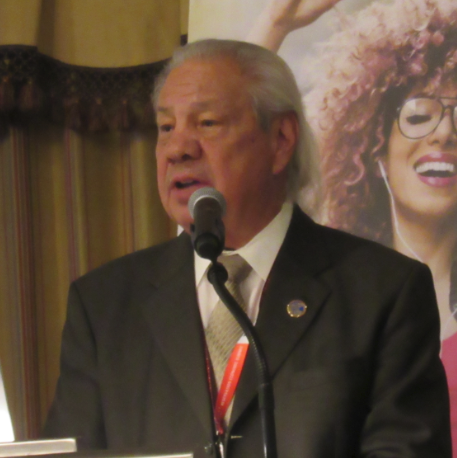Opinion. Late last month, one of Indian Country’s leading legal scholars, John Echohawk (Pawnee), addressed the Coalition of Large Tribes (COLT) on the topic of Native voting at its quarterly meeting in Las Vegas.

Echohawk was part of a voting rights program that also included vice president of Fair Count Jeanine Abrams McLean, the sister of voting rights advocate Stacey Abrams. Echohawk’s message was that Native people have to stay involved and persuade those who represent them in Congress to pass voting rights law.
Donate today to help us uplift Native Voices, Native Perspectives and Native News.
Echohawk, who has served as the executive director of the Native American Rights Fund (NARF) since 1977, recounted the many years of legal fights against voting discrimination towards Native voters.
“From Alaska, Montana and North Dakota, we have fought and won cases against discrimination cases that tried to suppress the Native vote,” Echohawk said.
“Particularly up in North Dakota – it was very obvious. They knew most of our reservation residents did not have street addresses so they passed a law that said you cannot vote unless you have an ID with a street address, not a post office box number on it. Of course, that disqualified our people. That discrimination was very obvious. It was a violation of our rights under the Constitution,” Echohawk said.
Echohawk referenced NARF’s Native American Voting Rights Coalition that held nine public hearings among Native voters during 2017 and 2018. The group produced a 176-page Obstacles at Every Turn: Barriers to Political Participation Faced by Native American Voters report last June prior to the 2020 presidential election.
“Regardless of whether they live in urban or rural areas, members of the 574 federally recognized tribes face many contemporary barriers to political participation. Although many other American voters share some of these obstacles, no other racial or ethnic group faces the combined weight of these barriers to the same degree as Native voters in Indian Country,” the report says.
The report cites several factors that discourage political participation in elections. Among the factors are (1) geographical isolation; (2) physical and natural barriers; (3) poorly maintained or non-existent roads; (4) distance and limited hours of government offices; (5) technological barriers and the digital divide; (6) low levels of educational attainment; (7) depressed socio-economic conditions; (8) homelessness and housing insecurity; (9) non-traditional mailing addresses such as post office boxes; (10) lack of funding for elections; (11) and discrimination against Native Americans.
While Echohawk was pleased with the court victories upholding the voting rights of Native Americans, he said he was troubled by the Brnovich v. Democratic National Committee decision by the U.S. Supreme on July 1, 2021 that overturned two Arizona laws that were deemed as restrictive against the Native vote in the state.
Echohawk said NARF represented the National Congress of American Indians in court by filing an amicus brief in Brnovich to address these issues.
On the same day the Supreme Court’s decision was released, Navajo Nation President Jonathan Nez told Native News Online “the opinion ignores the unique challenges that many tribal nations face during every election and does nothing to protect our voting rights and increase voting access.”
Echohawk says it is important for Congress to pass a comprehensive voting rights law to protect the Native vote. He said Sen. Ben Ray Luján (D—N.M.) plans to reintroduce the Native American Voting Rights Act (NAVRA) originally introduced by Sen. Tom Udall in 2019. The legislation that would ensure equal access to voting for all Native American voters living on tribal lands will empower tribal communities in their efforts to improve access to voter registration, education on voting procedure, and ensuring equal treatment of tribal identification at the ballot box.
“On top of geographic and linguistic barriers that make it harder for tribal members to vote, restrictive and burdensome voter registration requirements and I.D. laws are suppressing the Native vote across America,” Luján said in support of reintroducing the Native American Voting Rights Act while visiting the Navajo Nation in July.
“We really need the Native American Voting Rights Act,” Echohawk said. We all have to get involved in the political process in Washington, D.C. This is our only hope. Congress needs to fix what the Supreme Court did. We need to get Congress to act on this now,” Echohawk said to conclude his remarks at the COLT meeting.
Indian Country needs to heed the advice of John Echohawk and show our votes and our voices count.
More Stories Like This
The SAVE America Act Threatens Native Voting Rights — We Must Fight BackThe Presidential Election of 1789
Cherokee Nation: Telling the Full Story During Black History Month
Jesse Jackson Changed Politics for the Better
Native News Online at 15: Humble Beginnings, Unwavering Mission
Help us defend tribal sovereignty.
At Native News Online, our mission is rooted in telling the stories that strengthen sovereignty and uplift Indigenous voices — not just at year’s end, but every single day.
Because of your generosity last year, we were able to keep our reporters on the ground in tribal communities, at national gatherings and in the halls of Congress — covering the issues that matter most to Indian Country: sovereignty, culture, education, health and economic opportunity.
That support sustained us through a tough year in 2025. Now, as we look to the year ahead, we need your help right now to ensure warrior journalism remains strong — reporting that defends tribal sovereignty, amplifies Native truth, and holds power accountable.
 The stakes couldn't be higher. Your support keeps Native voices heard, Native stories told and Native sovereignty defended.
The stakes couldn't be higher. Your support keeps Native voices heard, Native stories told and Native sovereignty defended.
Stand with Warrior Journalism today.
Levi Rickert (Potawatomi), Editor & Publisher

